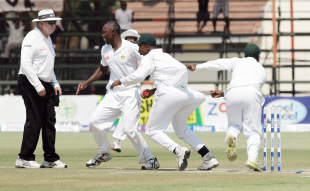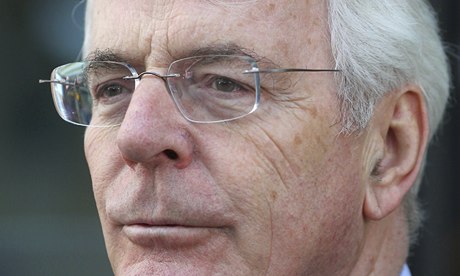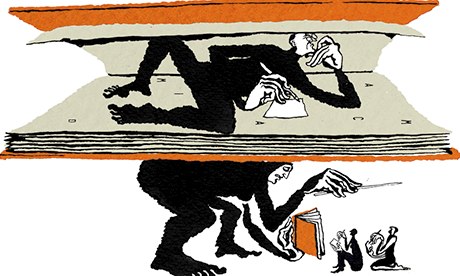| 
| Whether quotas were right for Zimbabwe or not, their current side is one far more reflective of the nation's demographics © AFP |
| Enlarge
|
|
|
|
"The heroes of our nation, dedicated to building the foundation of cricket for generations to come." Thus does the Cricket South Africa website hail its most important employees. Scroll down and you'll find an even more important assertion: "We can't undo the past, but we can shape the future."
Quotas cannot undo the past: their function is to shape the future by undoing the legacy of the past. Hence the recent decision to oblige South Africa's six franchises to field at least one black African in every match (for amateur teams the requirement doubles). On the face of it, this doesn't sound terribly onerous. It's certainly a far cry from the system Kevin Pietersen insists, disingenuously, drove him to England. One fact justifies this latest condition: 22 years after readmission, Makhaya Ntini remains the sole black African to have won 30 Test caps.
Affirmative action - or, as we Brits prefer, positive discrimination - is one of the most bitterly contested issues of the age. To some it oozes pros; to others, copious cons. To some it redresses prejudice, ancient and present; to others it either ignores other socio-economic factors or simply incites another form of prejudice, usually against those unfortunate enough to be paying for the sins of their fathers. In sport, purportedly the ultimate meritocracy, affirmative action is especially divisive. It will plainly take decades, even centuries, to atone for the sins of apartheid. South African sport has sought to balance those lopsided books via selection quotas, known officially as the "target transformation" policy, a step taken to equally justified and perhaps even more turbulent effect in Zimbabwe.
The complexity of all this is captured by Fisher v University of Texas, a legal case in the USA that is threatening to reverse the 2003 landmark decision in Grutter v Bollinger. Mindful of the Equal Protection Clause of the 14th Amendment, the US Supreme Court was tasked with deciding whether race can be a factor in deciding university admissions. In June, the case was thrown back to a lower court, a move welcomed by proponents of affirmative action: the principle, after all, had not been reversed. Recently, however, the "race-neutral" approach has even been advocated by the Project 21 leadership network, a group of African-American conservatives.
****
By contrast, Kevin Brown, a law professor at Indiana University and author of a forthcoming book on affirmative action, believes it would be a "massive mistake" to substitute consideration of an applicant's socio-economic background for his or her race. "We seem to be forgetting why affirmative action was created in the first place. Yes, of course it's true that individuals from poor backgrounds, regardless of skin colour, face obstacles in obtaining the kind of academic success valued by higher education institutions. But blacks and Latinos are disadvantaged in American society, even when adjusting for socio-economic factors."
Education, of course, is much more important than sport. Besides, why should sport be expected to discriminate, however positively, when other branches of the cultural tree are not? It may be his greatest weakness, but try telling Woody Allen to hire more black actors. He would argue, not unreasonably, that he makes movies about the world he knows, a world of white masters and black servants / prostitutes / entertainers. Sport differs because its legitimacy depends on fairness, and fairness begins with equality of opportunity. Without such foundations, its social value vanishes.
Cricket first tiptoed down this rocky road four decades ago, when the International Wanderers, a private party comprising several eminent English and Australian players, took on multi-racial XIs in South Africa. Such ventures ended in 1976, after hundreds of schoolchildren were killed in Soweto while protesting the government's education policies.
How illuminating, then, to dip into Luke Alfred's The Art of Losing, published last year, and learn that just three members of the South African team at the 1992 World Cup had voted in the whites-only referendum that approved the continuation of President FW De Klerk's reforms (had the decision gone the other way, warrants Alfred, they would have had to return home mid-tournament). Ahead lay those trials by quota.
In 1998, encouraged by the ANC, the United Cricket Board of South Africa laid down the law: the starting XI for each international match should include at least four players of "colour". Quotas were also introduced at provincial level. Adherence was never strict.
The first major row erupted in 2002 when the national selectors chose Jacques Rudolph ahead of Justin Ontong against Australia, only to be overruled by Percy Sonn, the board president. As a consequence, Ontong, who counted Rudolph as a friend, endured one of the most fiery and unenviable of baptisms. Double-edged swords don't come much more jagged than this. Knowing you've been picked not on your merits but because what was once an unfortunate accident of birth was now an advantage must play merry hell with one's self-esteem.
A relentlessly controversial figure whose administrative career would bring him to the heights of the ICC presidency and the depths of fraud allegations and alcohol-fuelled public disgrace, Sonn was roundly criticised by the cricketing fraternity; yet even those who believed he should have been focusing his efforts on improving coaching facilities for black schoolchildren understood his motives. "No doubt Sonn," noted theGuardian, "has seen too many examples of lip-service being paid to a quota system while, behind the scenes, not much is being done to attack the roots of an historic injustice."
Reflecting the elitism of a sport showing few signs of gaining traction in a black community conspicuously more enamoured of football, South Africa's 2007 Rugby World Cup-winning XV numbered only a couple of non-white faces. In cricket, another sport dominated by the elite white schools, politicians and administrators believed reformation should be a top-down process, billed as "targeted transformation". "As long as we have an abnormal society," Norman Arendse, the CSA president at the time, emphasised in 2007, "quotas and targets are not only desirable but also a constitutional imperative."
| | | | |
| |
| Why should sport be expected to discriminate, however positively, when other branches of the cultural tree are not? |
| |
| | |
|
This prompted some problematic arguments. When Graeme Smith wanted to omit Ntini from a critical World Cup match, he was obliged to justify himself in a lengthy one-on-one with the CSA chief executive,Gerald Majola. Many argued that dressing-room morale was being undermined. By 2010, according to Tony Irish, the South Africa Cricket Association CEO, matters had become intolerable: "The players feel that as soon as a racial number is set for selection of the team (whether or not one calls this a quota or a target) it leads to a divisive dynamic within the team, and it is also degrading to the players of colour who should be there on merit, yet are labelled a quota/target player."
Cue a letter sent to Arendse and his fellow board members in 2007 by a group of senior players led by Ashwell Prince, soon to become the national team's first coloured captain. In it, they demanded an end to "artificial" selection at the highest level. Later that year, Makhenkesi Stofile, the sports minister, scoffed at the quotas as "window dressing", signifying a shift towards the notion that victory on the field would be a more effective form of inspiration.
****
In this sphere, Zimbabwe is well ahead of its big brother. It was the quota system that spurred 15 white players to mount a rebellion in 2004, led by Heath Streak. Today Streak is adamant that most of the nation's professionals, regardless of skin colour, were opposed to quotas and that his black colleagues, whose job options were far narrower, declined to revolt only because they feared the repercussions. The recent Test victory over Pakistan by a team far more reflective of the nation's demographics suggests that the angst has been worthwhile.
"Some sort of compensation or attempt at rectification is due to those non-white sportspeople who were directly or indirectly disadvantaged by apartheid." So acknowledged Dr Carl Thomen of the University of Johannesburg, in his 2008 book Is it Cricket? An Ethical Evaluation of Race Quotas in Sport. These "compensatory efforts", he nonetheless concluded, "must not come via the same principles which got us into the mess of apartheid in the first place". In writing his book, he sought "to show that the negative consequences of such policies far outweigh any good they may realistically claim to do".
Upon reading those sentiments a few weeks ago, I emailed the author. Surely, given the opportunities afforded the likes of Ntini and Hashim Amla, the quota system had been justified? He was not for turning. "I'm not sure that that policy was responsible [his italics] for their selection. Perhaps they were thrown in a bit earlier than otherwise, but I'm not sure you can credit the quota policies of the time with their success. The problem with quotas is that they are ethically indefensible, and they actively do damage. 'Necessity' doesn't come into it; they are evil, plain and simple."
Evil, really? How, then, do we describe apartheid? The counter-argument was summed up by my guest last weekend, John Young, a sportswriter, author and retired schoolteacher from the Western Cape and Thami Tsolekile's erstwhile agent. "Quotas were necessary precisely so that merit could be acknowledged," he reasons. "Good black players would never have been picked without them."
There's one mathematical equation we all know: wrong + wrong never = right. But sometimes being wrong for the right reasons can be preferable to being right for the wrong ones.







